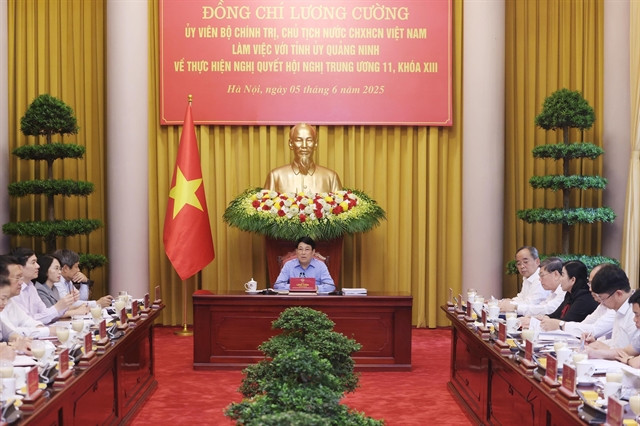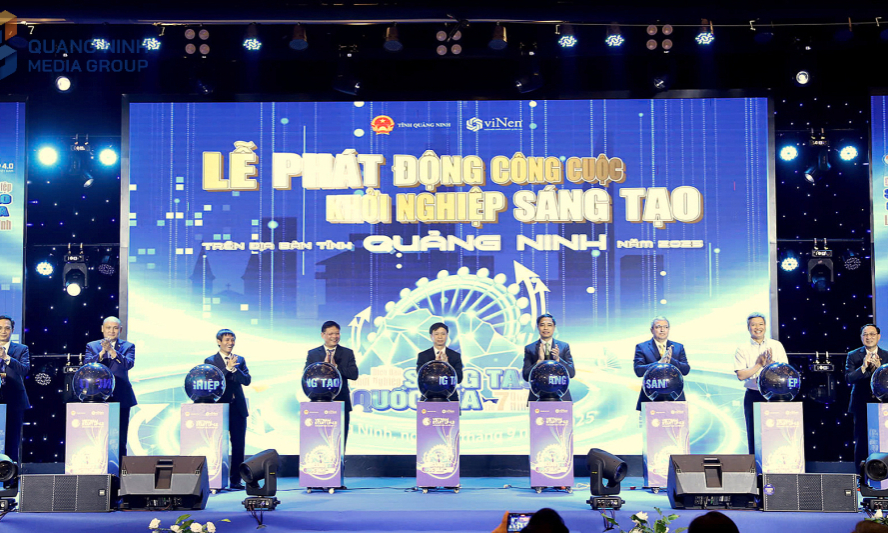President calls for streamlined, effective local governance structure in Quảng Ninh
President Lương Cường said that the restructuring of local government in Quảng Ninh Province must be carried out with discipline and clarity of purpose, to ensure operations are streamlined and become more efficient and effective.
Quảng Ninh Province needs to build a lean, efficient and effective two-tier local government system.
President Lương Cường told the province leaders during a working session at the Presidential Palace on Thursday morning in Hà Nội.
The working session discussed the implementation of the 11th Plenary Resolution of the 13th Party Central Committee, particularly in relation to the drafting of key documents and personnel planning.
He underscored that the restructuring of local administration must be carried out with discipline and clarity of purpose to ensure streamlined operations, greater efficiency and enhanced effectiveness.
It must strictly follow the Government directives and adhere to the approved plan, with strong leadership and tight oversight.
Cường told the province to focus on maintaining transparency and fairness throughout the reorganisation process.
"Personnel appointments at all levels must reflect merit and suitability, putting the right people in the right roles," he said.
Selected officials must have an innovative mindset and a willingness to take responsibility for bold decisions that serve the common good. They must also be capable of managing operations across a wide area under the new model.
Cường also instructed the province to step up inspection and supervision of the implementation of the Resolution.
He also called for robust measures to improve financial and public asset management, aiming to prevent wastefulness, losses and corruption during the transition.
With preparations underway for Party congresses at all levels, he urged the province to thoroughly review and refine all congress documents.
These must incorporate the Party Central Committee’s latest strategic orientations, particularly regarding political reports, Party building, the 2021-2030 socio-economic development strategy, and the five-year development plan for 2026–2030.
He also emphasised that congress documents should reflect the collective wisdom, will and aspirations of the province.
On personnel matters, he emphasised the need to combine ideological, organisational, and policy approaches in resolving issues concerning civil servants and public employees affected by the restructuring, especially those who are no longer eligible for re-election.
All support must be in line with regulations, and emerging challenges must be swiftly addressed.
He insisted that the reorganisation must not disrupt the ongoing operations of Party and Government agencies or affect citizens and businesses.
Socio-economic development targets must remain a top priority, with efforts focused on achieving the province’s established growth objectives.
Notable achievements
At the meeting, the provincial Party Standing Committee presented a report on the progress made in implementing the 11th Plenary Resolution.
According to the report, the province’s leadership has taken a proactive, comprehensive and resolute approach, ensuring timely and in-depth deployment.
The dissemination and study of the Resolution have been conducted rigorously, with creativity and effectiveness across all levels.
The restructuring of commune-level administrative units and the formation of a two-tier local government model have been executed decisively and methodically, in line with guidelines, timelines and procedural requirements.
The restructuring plan was meticulously developed, earning overwhelming support from voters, over 99 per cent in favour.
Public consultations, discussions at all levels of People’s Councils and the passage of implementation resolutions were handled with transparency and strict compliance.
Quảng Ninh aims to complete preparations and launch the pilot two-tier local government model by June 15, with full implementation from July 1 this year. Operations of local agencies have remained stable during the transition and preparations for the new model are being finalised to ensure smooth and effective functioning.
Support policies for affected staff have been well-organised, transparent and targeted, helping to stabilise morale and foster a broad consensus among the workforce.
Quảng Ninh has also made major strides in digital transformation. A new operations management system has been rolled out across Party organisations, while efforts to digitise records and improve public service delivery have been ramped up.
The province has promoted AI literacy and digital skills among officials through training campaigns, deepening the impact of its 'Digital Literacy for All' programme.
On the economic front, Quảng Ninh continued to post impressive growth, with the first quarter's GRDP rising by 10.91 per cent, surpassing projections.
Authorities at all levels have proactively developed quarterly growth scenarios and taken measures to resolve bottlenecks in public investment, planning, land clearance and land use conversion.
The investment climate, administrative reform and public and business satisfaction levels have remained among the best nationwide, cementing Quảng Ninh’s role as a key growth driver in northern Việt Nam.
The provincial Party Standing Committee has revised its 2025 growth target to over 14 per cent, up by two per cent from the Government’s benchmark in Resolution 25/NQ-CP, marking the highest projection to date.
President Lương Cường commended the province’s proactive, responsible and creative approach in studying and implementing the 11th Plenary Resolution.
He acknowledged the broad consensus and unity achieved across the Party, involving officials and local communities.






